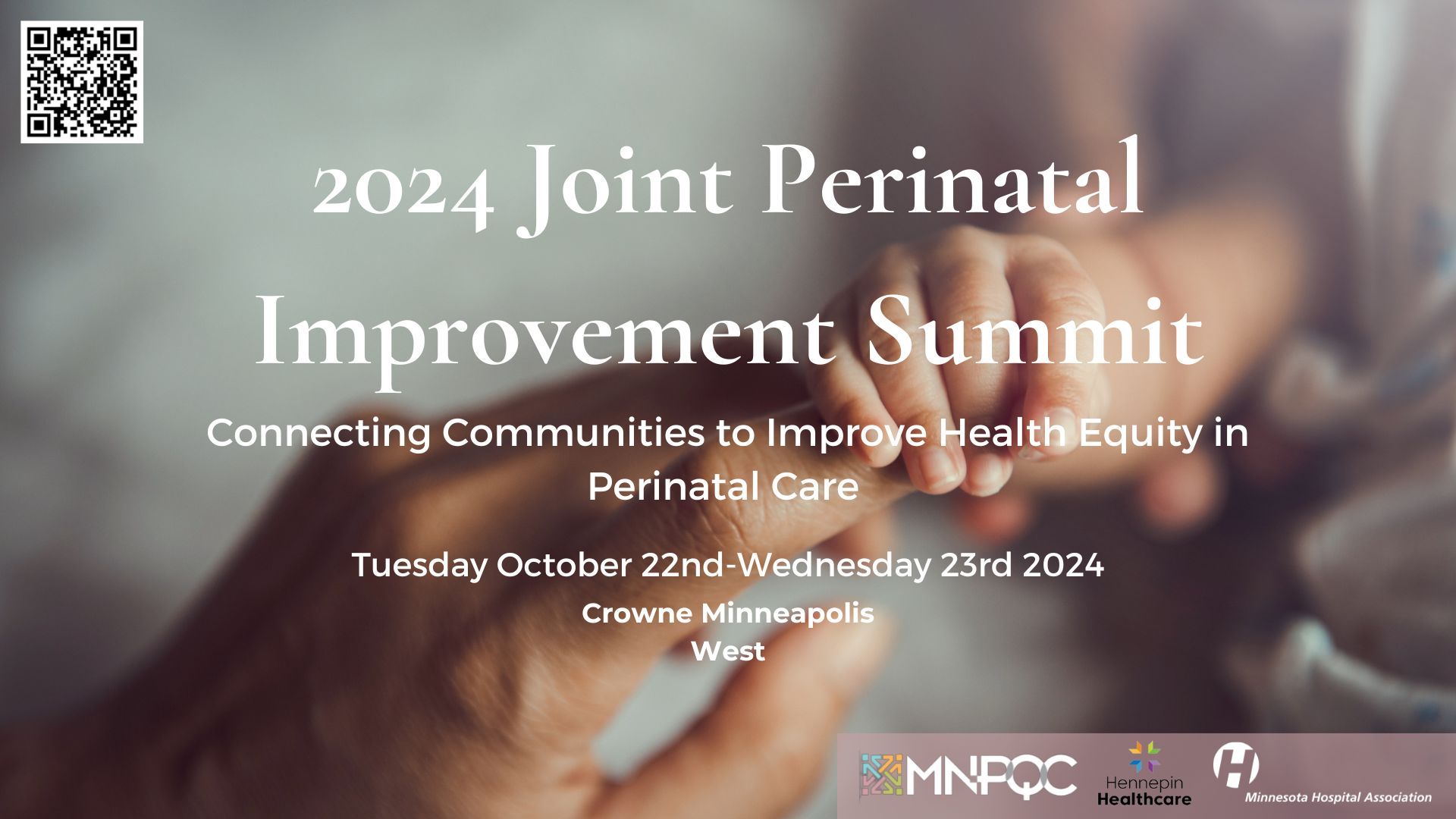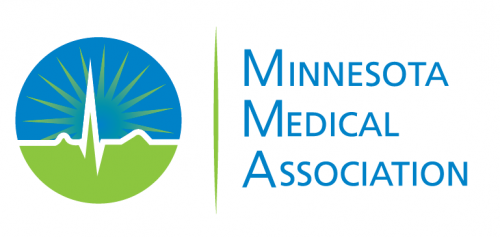
About the Conference
The 2024 Joint Perinatal Improvement Summit is hosted by the Minnesota Hospital Association (MHA), the Minnesota Perinatal Quality Collaborative (MNPQC), and Perinatal Substance Use Workforce Development Project. It provides an “All Teach, All Learn” opportunity for education, resources and expertise sharing with a space to make connections across disciplines, hospitals and statewide geography as we work to improve perinatal health outcomes and experiences for our MN families.
Event Audience
Interdisciplinary perinatal health professionals from birthing hospitals and health systems across Minnesota, including obstetricians, neonatologists, pediatricians, nurse midwives, and other perinatal healthcare practitioners, nurses, lactation counselors, perinatal health educators, social workers, quality leaders, administrators, payers, public health professionals, community organizations and all advocates interested in perinatal health.
2024 Joint Perinatal Improvement Summit
(talk titles and order subject to change)
(talk titles and order subject to change)
-
- Day 1: Tuesday October 22, 2024
- 12:00 – 12:45pm: Registration, Visit with Sponsors
- 12:45 – 1:00pm: Welcome: John Sellner and Brian Grahan
- 1:00 – 2:00pm: Plenary 1: Finding the Northstar: Inequities in Perinatal Mental Health Care – Tolulope Odebunmi
- 2:15-3:15pm: Breakout Sessions #1
- A Closer Look: Child Welfare Disproportionality – Thomas Berry and Katy Armendariz
- MDH Task Force on Prenatal Health and Substance Use Disorders: Recommendation and Discussion – Kurt DeVine and Brittany Wright
- Advancing Perinatal Substance Use Treatment in Rural Minnesota: Overcoming Barriers and Reducing Inequities – Carmichael Finn
- Perinatal Hypertension Disorders: How One Hospital System and Public Health Department Joined Forces to Provide Innovative Services to Improve the Outcomes – Lisa Konicek, Emily Lian, Jessica Zschunke, and Mallory Cummings
- Innovative Strategies for Congenital Syphilis Reduction – Stephen Contag
- 3:15 – 3:30pm: Break
- 3:30 – 4:30pm Breakout Sessions #2
- Insights and Updates from the MN Maternal Mortality Review Committee on Substance Use Disorder – Jennifer Almanza and Rachael McGraw
- A Closer Look: Child Welfare Disproportionality – Thomas Berry and Katy Armendariz
- MDH Task Force on Prenatal Health and Substance Use Disorders: Recommendation and Discussion – Kurt DeVine and Brittany Wright
- Trauma and PTSD during childbirth: why you should ask and what should be done about it – Leslie Carranza and Katherine Moore
- Health Cares About Domestic Violence: Applying A Universal Education Approach to Patient Screening – Meggie Royer, Julia Tindell, Erica Lester, Carlie Abel
- 4:30 – 5:30pm Breakout Sessions #3
- Insights and Updates from the MN Maternal Mortality Review Committee on substance Use Disorder – Jennifer Almanza and Rachael McGraw
- The Perinatal Substance Use Disorder AIM Bundle and It’s Implementation at a Twin Cities Hospital – Adrienne Richardson
- It is Time to Say Goodbye to PPH Racial Disparities – Mallory Cummings and Saranae Thimm
- Electronic Fetal Monitoring: What Are We Doing? How Do We Talk to Each Other? – LeeAnn Hubbard and Jeannine Nelson
- Day 1: Tuesday October 22, 2024
-
- Day 2: Wednesday October 23, 2024
-
- 8:00 – 9:00am Breakfast, Registration, Visit with Sponsors
- 9:00 – 9:15am: Welcome: Jasmin Hulin
- 9:15 – 10:15am: Plenary 2: Creating Change and Managing Resistance – Veronica Gillispie-Bell
- 10:15 – 10:30am: Break
- 10:30 – 11:30am: Breakout Sessions #4
- Alcohol Use in Pregnancy: The Importance of Screening and Brief Intervention – Mollie O’Brien, Kendra Gludt and Julia Conkel Ziebell
- Community Collaboration: Enhancing Support for Moms through Strategic Partnerships and Culturally Competent Education – Nicole Fernandez
- Navigating Medication Options: Patient-Centered Approaches to Opioid Use Disorder during Pregnancy – Lauren Graber
- Financial Feasibility – Expanding Perinatal Services During Challenging Times in Health Care – Lisa Bauer
- 11:30 – 11:45am: Break
- 11:45 – 12:30pm: Lunch and Plenary 3: HRSA Maternal Child Health Resources and Innovations – Sharyl Trail
- 12:30 – 12:45am: Break
- 12:45 – 1:45pm Breakout Sessions #5
- Alcohol Use in Pregnancy: The Importance of Screening and Brief Intervention – Mollie O’Brien, Kendra Gludt and Julia Conkel Ziebell
- Navigating Medication Options: Patient-Centered Approaches to Opioid Use Disorder during Pregnancy – Lauren Graber
- Lived Experience Integration Forum – Bekah Bischoff
- Planning for the Unexpected: Statewide Community Birth Transfer Improvement – Rachel Pilliod
- 1:45 – 2:00pm: Break
- 2:00 – 3:00pm Breakout Sessions #6
- Harm Reduction and Parental Care – Kari Rabie and Chyna Pfeifer
- Overview of Substance Use Disorder Treatment Levels of Care with an Emphasis in Family Treatment – Nway Linn and Christina Ingracia
- Supporting Incarcerated Individuals as a Doula: Navigating Perinatal Substance Use – Sierra Leone’ Dillard
- Battling Bias: Learning from the Lived Experience to Improve Perinatal Care and Advance Health Equity – Lauriel Porter and Solaire Spellen
- 3:00 – 3:15pm: Break
- 3:15 – 4:15pm: Closing Plenary: Panel: The Importance of Family Voices in our Work: Breaking the Cycle of Exclusion – Beckah Bishoff, Lauriel Porter, William Moore, Moderator: Cinthia Rodriguez Navin
Presentation Descriptions and Objectives
This session will be interactive. It will provide an overview of perinatal mood and anxiety disorders with comorbid substance use disorders. Approaches to perinatal care and outcome disparities within the state and the nation will be highlighted. Participants will have an opportunity to rally around a common cause and identify ways to make a difference within their communities.
1. Participants will be able to describe current disparities and challenges in perinatal mental health care.
2. Participants will be able to reflect on and identify challenges within their own practice.
3. Participants will identify one thing they can implement as agents of change.
This presentation addresses racial inequality in child welfare through content that targets historical trauma, referral bias and human decision-making contributors to racial disproportionality.
1. Increase awareness of racial and ethnic inequities in the child protection system
2.Develop an understanding of how an individual’s background, values and beliefs impact their perception of child abuse and/or neglect
Presenter: Kelis Houston
This presentation will explore the significant work being done at Recovering Hope Treatment Center to address perinatal substance use in rural Minnesota. We will delve into the unique challenges faced by women and families in these areas, including barriers to care and disparate outcomes. Highlighting the innovative programs and strategies implemented by Recovering Hope Treatment Center, this session will provide a comprehensive overview of efforts aimed at reducing health inequities and improving access to quality care. Participants will gain insights into the importance of specialized treatment programs in rural settings and the impact of targeted interventions on the well-being of mothers and their children.
1. Identify Barriers to Perinatal Substance Use Treatment in Rural Areas: Understand the unique challenges and barriers to accessing perinatal substance use treatment in rural Minnesota, including geographic, socioeconomic, and systemic factors.
2. Analyze Disparate Outcomes and Health Inequities: Examine the disparate outcomes faced by women and families in rural settings due to limited access to specialized care, and understand the implications of these disparities on overall health and well-being.
3. Evaluate Programs and Strategies to Reduce Inequities: Explore the innovative programs and interventions implemented by Recovering Hope Treatment Center aimed at reducing health inequities, and assess their effectiveness in improving access to and quality of care for perinatal substance use treatment.
Hypertensive disorders of pregnancy (HDP) have been increasing in St. Louis County, around Minnesota and around the nation. Impacts can be devastating on both birthing people and their infants. Data also shows that Black and Indigenous individuals are disproportionally impacted by HDP. St. Louis County Public Health joined forces with Aspirus St. Luke’s hospital system to address these challenges through a health equity lens by forming an innovative partnership that starts at the hospital level and extends into the client’s home. By offering targeted and specific home visiting services, Public Health, Aspirus St Luke’s and the patient work as a team to help monitor signs, symptoms and other indicators to try to improve outcomes by intervention strategies from the prenatal period to postpartum. Part of this innovative program is the depth of service connection. In addition to the full scope of OB care, this teams helps patients establish primary care (if not already done), offers doula support and can refer for other specialty care as indicated, such as cardiology. The team also partners with the patient to assesses other factors that can impact health, such as food insecurity, lack of transportation, substance use disorders, mental health issues, and so on. While the goal is to reduce the impacts of hypertensive disorders of pregnancy, the team recognizes that a wholistic approach has the potential to improve the health and wellbeing of the pregnant person and their family well beyond the perinatal period.
1. Summarize key components of the Heart-to-Heart program.
2. Identify challenges / potential challenges / opportunities of program implementation.
3. Determine next steps to create a similar intervention with your systems.
Substance use disorder is a leading contributing factor of pregnancy associated deaths for birthing people in Minnesota, we will share a summary of the current data about SUD deaths in our state. Share with care providers with an in-depth look at the recommendations developed by our state’s MMRC around Substance Use Disorder, and evidence for the best practices embedded in these recommendations. These recommendations are developed by an interprofessional team of healthcare providers, social service providers, and community members for providers, healthcare systems, and policy makers to improve the lives of families in Minnesota.
1. Following this session, learners will understand common issues for families coping with substance use disorder.
2. Following this session, learners will identify multiple strategies that can be implemented to address substance use disorder in the perinatal period.
3. Following this sessions, learners will articulate key moments in the care continuum where families with substance use disorder are most at risk.
of traumatic birth experiences, with a focus on childbirth-related Post-Traumatic Stress Disorder (PTSD).
Through a blend of discussions, case studies, and real-world scenarios, participants will actively engage
in understanding the complexities of trauma during childbirth. By the end of this interactive session,
participants will leave with practical strategies for identifying and addressing PTSD related to childbirth,
enhancing their ability to provide compassionate and effective car.
1. Understand the psychological and emotional impact of traumatic birth experiences.
2. Identify the signs and symptoms of postpartum PTSD.
3. Explore evidence-based screening tools for detecting PTSD in postpartum individuals.
4. Examine intervention strategies and support for individuals affected by childbirth-related PTSD.
There is substantial research describing the dynamics and effects of intimate partner violence (IPV), human trafficking (HT), and exploitation and related co-morbid health and behavioral health outcomes for survivors. In this session, attendees will learn how the evidence-based CUES intervention can be implemented in healthcare settings to initiate conversations with patients about healthy relationships and violence. They will also discuss the benefits of collaborating with domestic violence advocacy programs to ensure patients have access to holistic care.
1. Identify basic dynamics of intimate partner violence (IPV), human trafficking (HT), and exploitation as they show up in healthcare settings.
2. Discuss the value of building strong relationships between healthcare settings and domestic violence programs.
3. Describe the evidence-based CUES intervention and locate additional information about its implementation after the session.
4. Connect with the Maternal Mortality Intervention Leadership Team to stay in touch about future training and learning opportunities.
In this session, participants will learn about Aspirus St. Luke’s journey beginning in 2020 on addressing PPH rates and the racial disparities embedded within those rates. The presentation will focus on the utilization of the Obstetric Hemorrhage AIM bundle and the CMQCC OB Hemorrhage toolkit to reduce overall PPH rates and eliminate racial disparities. In addition, participants will engage together and discuss ways in which their facilities can identify areas of improvement within their risk assessment tools, PPH identification, and response protocols.
1. Define PPH
2. Discuss QBL vs. EBL
3. Describe ways to implement the AIM Bundle 4. Identify areas of improvement to address PPH in your facility
A review of the FHR Categories as defined by NICHD, learning opportunities afforded by MHA, and real-life experiences with a decision-making and communication tool rolled out through HealthPartners.
1. Define the categories of FHR patterns and which are most concerning.
2. Review of two major decision-making tools that are available and see how you could incorporate into your practice.
3. Examine how a shared mental model of communication could enhance your unit’s safety.
Recent studies across the nation and here amongst Minnesota health systems show 1) screening for alcohol use during pregnancy is consistently falling below recommended guidelines, 2) disparities are present, and 3) implementation of brief interventions is frequently absent. These gaps result in missed opportunities to prevent alcohol use during pregnancy and reduce the incidence of FASD. This presentation will share recent local data on SBI and offer guidance on having conversations about drinking alcohol during pregnancy in a non-stigmatizing manner. Learn how prenatal alcohol exposure impacts your practice and how you can use this information to improve the quality of care and outcomes for pregnant individuals and infants in your care. Attendees will also learn how Proof Alliance can be a resource to you, your practice and the families you serve.
1. Based on the latest local data, understand the opportunities around Screening and Brief Intervention (SBI).
2. Learn about screening methods that address stigma and disparate outcomes.
3. Learn about what to do next when there has been alcohol exposure during pregnancy.
4. Discover programs and resources through Proof Alliance that can help you prevent prenatal alcohol exposure and care for those impacted.
Introduction to Community Collaboration: Understanding the role of community partnerships in maternal health. Maximizing Partnerships: Strategies to align community partnerships with maternal care outcomes for enhanced support
Identifying and utilizing local resources and programs to support maternal health. Ensuring that community education and support are inclusive and respectful of cultural differences.
This breakout session will discuss how a 37 bed community hospital had a strategic plan to increase Perinatal Services before the Covid-19 Pandemic hit. Due to timing of the project, everything moved ahead despite the grueling times of Covid. The discussion will contain how the need was identified, the strategic plan with the governing board, the expansion of the Birth Center and introduction of new service lines. The successes and opportunities learned along the way can help any healthcare system, large or small, create the best patient experience and outcomes amid the most challenging times in healthcare.
1. The learner will be able to identify two current healthcare system stressors.
2. The learner will be able to identify the impact of introducing nurse midwifery into an existing perinatal practice
3. The learner will be able to identify the importance of collaboration with outside resources to ensure support after hospital discharge.
- Describe different medications for Opioid Use Disorder, including naltrexone, methadone and buprenorphine
- Consider risks and benefits of these options both for the pregnant patient and fetus
- Describe medications that alleviate symptoms of opioid withdrawal
- Discuss different ways of initiating buprenorphine and methadone
Session Description
This presentation will explore the significant benefits of integrating lived experiences into quality improvement (QI) activities and describe the difference between hearing and listening. Participants will learn about the positive impacts this integration can have on healthcare outcomes. They will gain insights into how personal stories and patient experiences can drive meaningful changes in healthcare. Additionally, the forum will provide actionable strategies for becoming a champion of lived experience integration within your facility and extending your influence beyond.
Session Learning Objectives
1. Describe the difference in hearing and listening
2. Describe the benefits of having Lived Experience integrated in QI activities
3. Describe various ways to become a champion at your facility and beyond
Presenter: Bekah Bischoff, Program Manager, MoMMAs Voices
Implicit bias has been well documented as directly linked to the Black maternal mortality crisis and high rates of Black infant death. However, there is an underlying issue that drives Black maternal and infant mortality – systemic racism that leads to biased care that does not support healthy pregnancy, birth, and successful breastfeeding for Black women. Irth (as in Birth, but without the B for bias) is the first of its kind, non-profit review and recommendation platform for Black and brown women and birthing people to find and leave reviews of their prenatal, birthing, postpartum, and pediatric experiences of care. This session will focus on findings from the Irth app’s robust database of Black patient experiences of maternity and infant care, with a focus on Minnesota.
1. Understand key components of a community-centered approach within a reproductive justice framework applied to addressing racial disparities in breastfeeding.
2. Observe how biased care adversely impacts maternal and child health outcomes using data from the Irth app’s structured survey of hospital birthing experiences specifically focusing on feedback on doctors, nurses and lactation consultants in the birthing experience.
3. Learn how data translates to specific experiences of bias through a sampling of qualitative feedback from survey participants.
4. Explore how these identified experiences may help or hinder accessing ongoing maternal and infant health support outside of the hospital.
5. Identify key action steps to address gaps and challenges to equitable birth and breastfeeding experiences highlighted by Irth app users.
Session Description
Change is a necessary component of quality improvement but change is not easy! To be successful, you must understand the psychology of change to survive the emotional roller coaster! Learn the tips and tricks to be successful in change and managing resistance.
Session Learning Objectives
1. Define change
2. Define resistance
3. Identify how to effectively lead change
4. Describe how to manage resistance
Presenter: Veronica Gillispie-Bell, MD, MAS – Louisiana Department of Health
- Understanding the Role of a Doula
- The Impact on Maternal and Infant Health During Incarceration
- Alternatives to Incarceration
- Lessons Learned and Challenges Faced
- Building Trust and Rapport
- Developing Supportive Networks
- Policy Changes and Grassroot Efforts
- Real Stories/Questions/Comments
This panel brings together community leaders working to uplift the experiences and voices of their community, families, and individuals receiving care throughout our healthcare systems. We hope to explore and bridge the gap between healthcare providers and community voices fostering a more inclusive and respectful healthcare environment. The conversation will guide healthcare providers on actionable insights and foster a collaborative atmosphere between community, families, individual patients and health professionals.
Cinthia Rodriguez Navin, DNP, PHN, RN | Nurse Manager MHealth Fairview
Panel:
There is growing interest nationally in out of hospital births. Community birth advocates and patients have long recognized the need for improved safety & communication in community birth to hospital transfers. Perinatal quality collaboratives can play an important role in facilitating quality improvement in the safety of community birth transfers. This session will highlight the need for QI work, review statewide initiatives that have been undertaken in US states, and invite discussion for expanding this work in Minnesota.
1. Define community birth and describe birth attendants
2. Review data for tracking community birth transfers and patient experiences with transfer
3. Outline community birth transfer improvement initiatives successfully implemented in other states
4. Discuss needs and opportunities for furthering this work in Minnesota
We will review what led to the formation of the Task Force, goals and review the current draft of recommendations.
1. Understand what the task force was asked to address
2. Review the current process of screening for and reporting substance use in pregnancy
3. Understand the current recommendations being considered regarding substance use and pregnancy
The aim of those presentation is to review the evidence supporting interventions or processes to address the rise in congenital syphilis. Addressing this problem requires engagement of multiple teams l. We will review our work to date.
- Increase knowledge and awareness of Perinatal programming and funding at HRSA.
- Increase the utilization of the HRSA National Maternal Mental Health Hotline 1-833-TLC-MAMA, including accessing Toolkit to support participant organizations.
- Learn about the HRSA Region 5 Office of Intergovernmental and External Affairs and how this office can support Summit participants.
2024 Perinatal Improvement Summit Speakers
Sponsorship Packages
- Complimentary event registration for four attendees (includes conference meals, networking breaks, education sessions, and reception)
- Complimentary vendor table at the conference
- Prime recognition throughout the conference including company name and logo on conference signage, welcome slides, and conference brochure
- Social media promotion
- Access to the attendee list (name, organization, email)
- Opportunity to introduce a general session speaker
- 30-second pre-recorded video shared in conference email blast to registered attendees
- Complimentary event registration for two attendees (includes conference meals, networking breaks, education sessions, and reception)
- Complimentary vendor table at the conference
- Recognition on conference signage, welcome slides, and conference brochure
- Social media promotion
- Access to the attendee list (name, organization, email)
- Complimentary registration for one attendee (includes conference meals, networking breaks, education sessions, and reception)
- Company name and logo on reception signage
- Representative to give 5 minute speech at the start of reception
- Complimentary vendor table at the conference
- Complimentary registration for one attendee (includes conference meals, networking breaks, education sessions, and reception)
- Company name and logo on table tents at each conference table
- Complimentary vendor table at the conference
- Complimentary registration for one attendee (includes conference meals, networking breaks, education sessions, and reception)
- Complimentary vendor table at the conference
- If written notice of cancellation is received one month prior to the event, a refund less a $200 administrative fee will be made
- 501C3 non-profits or universities are eligible for a 40% discount on sponsorship
- Meal packages are available for guests for an additional $90 per day per guest
- All vendor tables will be 5 foot long tables
- The deadline to complete sponsorship registration is October 1st, 2024
- Please click here to complete your sponsorship registration
- With questions, please contact Heather Harmer, MHA Director Events and Education, at HHarmer@mnhospitals.org

Thank you to our partners and sponsors!
For more information contact: info@minnesotaperinatal.org








































